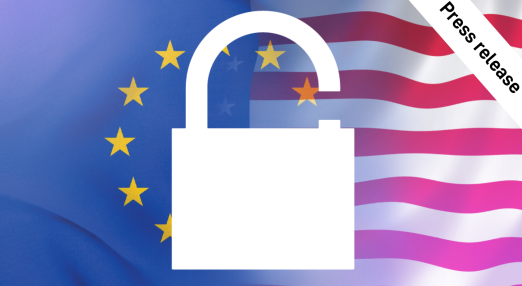Highlights
Filter by...
-

EDRi-gram, 11 October 2023
The autumn leaves have started to fall but not our spirits. We organised 180 civil society groups and eminent experts to call on governments to stop the use of facial recognition surveillance by police, authorities and private companies. We also mobilised 80 media, journalists, and human and digital rights organisations to urge MEPs to ban the use of spyware against journalists & so much more!
Read more
-

EDRi-gram, 27 September 2023
The weather might be cooling off but the digital rights world is heating up with activity. Civil society continues to fight against dystopian surveillance technology. More than 85 organisations have called on EU governments to say no to the CSA Regulation until it fully protects online rights, freedoms, and security. Over 115 civil society organisations are urging EU lawmakers to regulate the use of AI technology for harmful and discriminatory surveillance by law enforcement. In Czech Republic, EDRi member Iuridicum Remedium have details on the Czech police’s illegal use of a facial recognition system.
Read more
-

Press Release (CSA Regulation): Who benefits from the EU Commission’s mass surveillance law?
A newly-published independent investigation uncovered that the European Commission has been promoting industry interests in its proposed law to regulate the spread of child sexual abuse material online.
Read more
-

EDRi-gram, 13 September 2023
Are you ready to catch up on the recent digital rights developments in Europe after a nice summer break? The latest EDRi-gram has got you covered. From a fake social network that is spooking people in Warsaw to activists celebrating encryption, this edition brings you the hottest updates on everything digital. Stay informed and up to speed with the latest digital rights updates in Europe.
Read more
-

EDRi-gram, 12 July 2023
Keeping up with the fast-paced digital rights world is hard work, so we’re taking a well-deserved summer break. But there’s lots to update you on before we go. In this EDRigram, you can read about the ongoing efforts in the EU and the UK to protect encryption and keep the safety and integrity of everyone’s private communications intact. You can also read about what EU’s plans to digitise travel documents could mean for you – more convenient travelling or more discrimination? Since this is the last edition of the EDRigram before we break for the summer, we have an extended recommendation section to keep you from from missing us while we’re away. Have a great summer!
Read more
-

EDRi-gram, 28 June 2023
Recent developments in crucial digital European Union regulations have raised many eyebrows as we see attempts to undermine human rights. 27 civil society organisations, including EDRi, stood against the use of people's sensitive information to target them with political messages online. 65 civil society and journalist associations also urged the Council of the European Union to ensure stronger safeguards to protect journalists in the European Media Freedom Act. In this edition, you can also read about how digital rights are a civic space issue and why privacy is not a crime.
Read more
-

EDRi-gram,14 June 2023
It’s getting hot in here – and we don’t just mean the weather. By the time this EDRi-gram reaches your inbox, the EU Parliament will have voted on the AI Act and the "e-Evidence" package. This is a crucial moment for the AI Act as we push hard and keep our fingers crossed for all the wins of the committee vote to remain after the plenary. We also have serious concerns about the e-Evidence proposal posing a threat to our fundamental rights. Along with other civil society groups, doctors and journalists organisations and internet service providers, we are calling on Members of European Parliament to reject this package. In this edition you can also read about what changed in the ten years since Snowden’s revelations about mass surveillance by the US government.
Read more
-

EDRi-gram, 31 May 2023
Here is what happened since we last touched base. The EDRi network met in Belgrade for our General Assembly. We strategised, got updates from national members about the state of #DigitalRights, and enjoyed personal connection time. A BIG welcome to EDRi's newly elected Board members: Andrej Petrovski, Director of Tech at EDRi member SHARE Foundation, and Isabela Fernandes, Executive Director of TOR Project. In the last fortnight, we also celebrated 5 years of the General Data Protection Regulation. The anniversary was marked by the €1.2 billion fine for Meta issued thanks to EDRi member noyb's work. The decision required 10 years and 3 court procedures against the Irish Data Protection Commission, which shows the need for better GDPR enforcement.
Read more
-

EDRi-gram, 17 May 2023
Last week, European Parliament committees voted to protect people’s rights in the AI Act. In a landmark moment, Members of Parliament (MEPs) supported all key civil society demands. We’re still concerned about some gaps and loopholes but it’s a big win for our network and partners’ work! The PEGA committee also adopted its final report and recommendations. It included many valuable proposals but failed to go all the way in calling for an EU-wide ban on spyware. You can also read our take on what’s missing from the EU Digital Decade report (spoiler alert: our rights).
Read more
-

EDRi-gram, 3 May 2023
This week, as the EU Parliament gets ready to vote on the AI Act, we are urging members of Parliament to protect people’s rights in this landmark legislation. We are putting forward our recommendations to lawmakers on protecting journalists from all kinds of surveillance through the European Media Freedom Act. Among other digital rights updates, read about how Irish and French Parliamentarians have become the latest voices to sound the alarm against monitoring of people’s messages in the proposed Child Sexual Abuse Regulation. You can still share your feedback on the draft programme for an initial decolonising process for the digital rights field in Europe.
Read more
-

EDRi-gram, 19 April 2023
In this edition of the EDRi-gram, we are inviting you to share your feedback on a draft programme for an initial decolonising process for the digital rights field in Europe. Multiple voices are raised against the EU CSAR proposal amidst plans revealing the wish to systematise government access to data. We are also looking at why it's important to uphold patients’ rights in a new health data law. And what are the consequences of the recently adopted Law on Olympic Games in France, which formalises the introduction of algorithmic video-surveillance.
Read more
-

EU-US plan offensive to legitimise police access to data, civil society responds amid growing fears – Press Release
On 6 April 2023, EDRi and 8 partners sent an open letter to the European Commission President Ursula von der Leyen and Vice President Margrethe Vestager, as well Swedish Prime Minister Ulf Kristersson. Through the letter, the organisations called out the clear and deliberate plans to disregard international human rights standards in the EU-US approaches to security in the digitalised society, in particular in regards to end-to-end-encryption.
Read more
